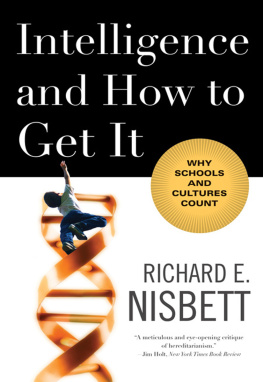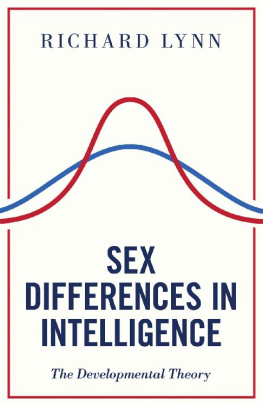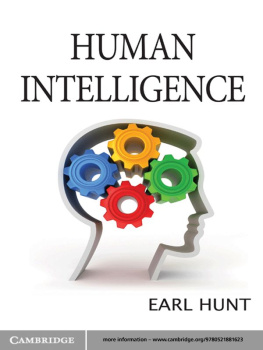ALSO BY RICHARD E. NISBETT
Intelligence
AND HOW TO GET IT
Why Schools and Cultures Count
RICHARD E. NISBETT

W. W. NORTON & COMPANY
New York London
Copyright 2009 by Richard E. Nisbett
All rights reserved
For information about permission to reproduce selections from this book, write to Permissions, W. W. Norton & Company, Inc., 500 Fifth Avenue,
New York, NY 10110
Production manager: Anna Oler
Library of Congress Cataloging-in-Publication Data
Nisbett, Richard E.
Intelligence and how to get it: why schools and cultures count / Richard E. Nisbett.1st ed.
p. cm.
Includes bibliographical references.
ISBN: 978-0-393-07141-2
1. Intellect 2. Intelligence 3. Schools. 4. Culture. I. Title.
BF431.N57 2009
153.9dc22 2008044477
W. W. Norton & Company, Inc.
500 Fifth Avenue, New York, N.Y. 10110 www.wwnorton.com
W. W. Norton & Company Ltd.
Castle House, 75/76 Wells Street, London W1T 3QT
For
LEE ROSS
CONTENTS
ACKNOWLEDGMENTS
THE WRITING OF THIS BOOK , and some of the research reported in it, was supported by the National Science Foundation under Grant No. 0717982 and by the National Institute on Aging under Grant No. 1RO1AG029509-01A2. Neither agency should be assumed to endorse the views represented in the book. The psychology department of Columbia University and the Russell Sage Foundation contributed valuable resources and facilities.
Many people generously provided ideas and criticism that improved this bookthough none of them is responsible for any errors in it. These people include Joshua Aronson, Douglas Besharov, Clancy Blair, Jeanne Brooks-Gunn, Hannah Chua, William Dickens, James R. Flynn, Phillip Goff, Richard Gonzalez, David Grissmer, Diane Halpern, Lawrence Hirschfeld, Earl Hunt, Shinobu Kitayama, Matt McGue, Walter Mischel, Randolph Nesse, Dan Osherson, Daphna Oyserman, Denise Park, Richard Rothstein, Peter Salovey, Kenneth Savitsky, Edward E. Smith, Jacqui Smith, Claude Steele, Robert Sternberg, Eric Turkheimer, Barbara Tversky, Jane Waldfogel, and Oscar Ybarra. I am grateful to my agents, John Brockman and Katinka Matson, for representing me and for facilitating the publics access to scientific writing. I thank my editorsAngela von der Lippe, Erica Stern, and Mary Babcockfor excellent work in bringing the manuscript to publication. Laura Reynolds provided assistance in preparing the manuscript. Katherine Rice provided invaluable help in the form of library research and vigorous and constructive criticism. Susan Nisbett made excellent suggestions and provided sage advice.
Lee Ross contributed to this book, as he has to all my other projects since I first met him in graduate school. For his intellectual stimulation and his friendship, this book is dedicated to him.
Intelligence
HOW TO GET IT
CHAPTER ONE
Varieties of Intelligence
By intelligence the psychologist [means] inborn, all-around intellectual abilityinherited, not due to teaching or traininguninfluenced by industry or zeal.
Sir Cyril Burt and colleagues (1934)
I BEGAN HAVING TROUBLE with arithmetic in the fifth grade, after I missed school for a week just when my class took up fractions. For the rest of elementary school I never quite recovered from that setback. My parents were sympathetic, telling me that people in our family had never been very good at math. They viewed math skills as something that you either had or not, for reasons having mostly to do with heredity.
My parents probably were not aware of the psychological literature on the question of intelligence, but they were in tune with it. Many if not most experts on intelligence in the late twentieth-century believed that intelligence and academic talent are substantially under genetic controlthey are wired in and more or less unfold in any reasonably normal environment. Such experts were suspicious about the likely success of any effort to improve intelligence and were not surprised when interventions such as early childhood education failed to have a lasting effect. They were quite dubious that people could become smarter as the result of improvements in education or of changes in society.
But the results of recent research in psychology, genetics, and neuroscience, along with current studies on the effectiveness of educational interventions, have overturned the strong hereditarian position on intelligence. It is now clear that intelligence is highly modifiable by the environment. Without formal education a person is simply not going to be very brightwhether we measure intelligence by IQ tests or any other metric. And whether a particular persons IQand academic achievement and occupational successis going to be high or low very much depends on environmental factors that have nothing to do with genes.
There are three important principles of this new environmentalism:
- Interventions of the right kind, including in schools, can make people smarter. And certainly schools can be made much better than they are now.
- Society is making ever greater demands on intelligence, and cultural and educational environments have been changing in such a way as to make the population as a whole smarterand smart in different ways than in the past.
- It is possible to reduce the IQ and academic achievement gap that separates people of lower economic status from those of higher economic status, as well as the gap between the white population and some minority groups.
The basic message of this book is a simple one about the power of the environment to influence intelligence potential, and more specifically about the role that schools and cultures play in affecting the environment. The accumulated evidence of research, much of it quite recent, provides good reason for being far more optimistic about the possibilities of actually improving the intelligence of individuals, groups, and society as a whole, than was thought by most experts even a few years ago.
On the other hand, just as there are laypeople and experts who are wrongly convinced that intelligence is mostly a matter of genes, there are laypeople and experts who have mistaken and sometimes overly optimistic ideas about the sorts of things that can improve intelligence and academic performance. One of the goals of this book is to present evidence on which interventions are most effective.
The chapters that follow emphasize that societal and cultural differences among groups have a big impact on intelligence and academic achievement. People of lower socioeconomic status have lower average IQs and achievement for reasons that are partly environmentaland some of the environmental factors are cultural in nature. Blacks and other ethnic groups have lower IQs and achievement for reasons that are entirely environmental. Most of the environmental factors relate to historical disadvantages but some have to do with social practices that can be changed.
Culture can also confer advantages for the development of intelligence and academic achievement. Some cultural groups have distinct intellectual advantages, on average, over the mainstream white population. These include people with East Asian origins and Ashkenazi Jews. Later, I discuss what these advantages are due to and whether some of them might be adopted by others who would like to increase their own intelligence and academic achievement.













